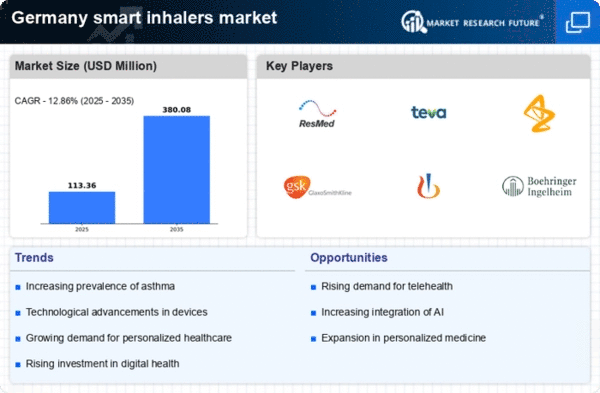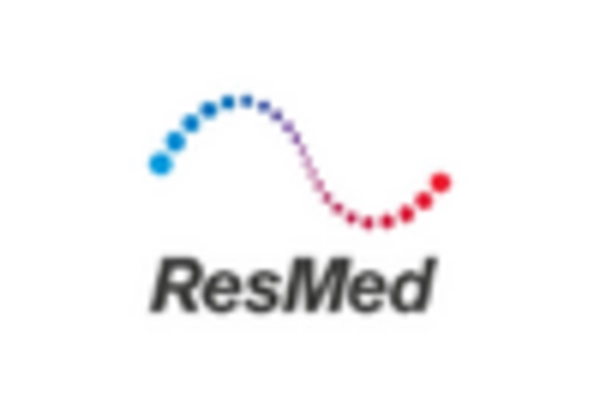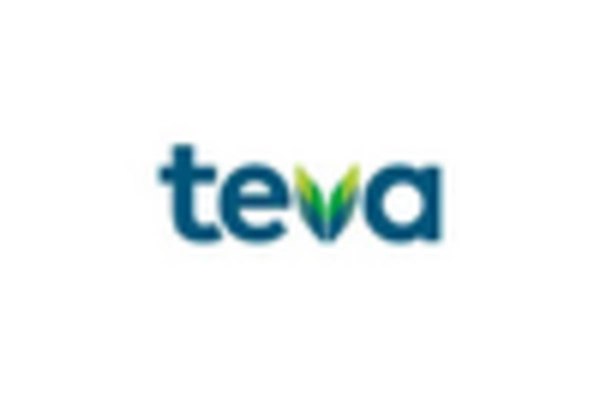Technological Integration in Healthcare
The integration of advanced technologies in healthcare is significantly influencing the smart inhalers market. In Germany, the adoption of digital health solutions is on the rise, with a reported 30% increase in telemedicine usage over the past year. Smart inhalers, which utilize sensors and mobile applications, provide real-time data on medication usage and environmental triggers. This technological advancement not only enhances patient engagement but also facilitates better communication between patients and healthcare providers. As the healthcare system increasingly embraces digital transformation, the smart inhalers market is expected to benefit from this trend, leading to improved patient outcomes and adherence rates.
Government Initiatives for Digital Health
The German government is actively promoting digital health initiatives, which serve as a catalyst for the smart inhalers market. With the implementation of the Digital Healthcare Act, healthcare providers are encouraged to integrate digital solutions into patient care. This legislative support aims to enhance the quality of healthcare services and improve patient access to innovative technologies. As a result, the market for smart inhalers is likely to expand, with increased funding and resources allocated to digital health solutions. The government's commitment to fostering a digital health ecosystem indicates a promising future for the smart inhalers market, as more patients gain access to these advanced devices.
Growing Awareness of Medication Adherence
There is a growing awareness regarding the importance of medication adherence among patients and healthcare professionals in Germany. Non-adherence to prescribed inhaler regimens can lead to severe health complications and increased healthcare costs. Smart inhalers, designed to track usage and remind patients to take their medication, are becoming essential tools in promoting adherence. Recent studies indicate that adherence rates can improve by up to 30% with the use of smart inhalers. This heightened focus on adherence not only benefits patients but also reduces the overall burden on the healthcare system. Consequently, the smart inhalers market is likely to experience growth as more stakeholders recognize the value of these devices in ensuring effective treatment.
Rising Prevalence of Respiratory Diseases
The increasing incidence of respiratory diseases in Germany is a primary driver for the smart inhalers market. Conditions such as asthma and chronic obstructive pulmonary disease (COPD) are becoming more prevalent, affecting millions of individuals. According to recent health statistics, approximately 5.5 million people in Germany suffer from asthma, while COPD affects around 3 million. This growing patient population necessitates innovative solutions for effective disease management. Smart inhalers, equipped with digital technology, offer enhanced monitoring and adherence capabilities, which are crucial for managing these chronic conditions. As healthcare providers and patients seek more efficient treatment options, the demand for smart inhalers is likely to rise, thereby propelling the market forward.
Increased Investment in Healthcare Innovation
Investment in healthcare innovation is a significant driver for the smart inhalers market in Germany. Venture capital funding for health tech startups has surged, with investments reaching over €1 billion in the last year alone. This influx of capital is fostering the development of innovative solutions, including smart inhalers that leverage artificial intelligence and data analytics. As companies strive to create more effective and user-friendly devices, the market is poised for expansion. The emphasis on innovation not only enhances product offerings but also attracts more consumers seeking advanced healthcare solutions. Thus, the smart inhalers market is likely to thrive in this environment of increased investment and innovation.
















